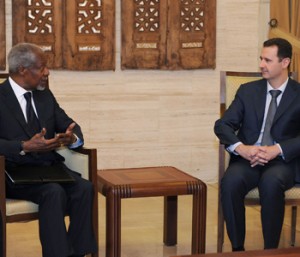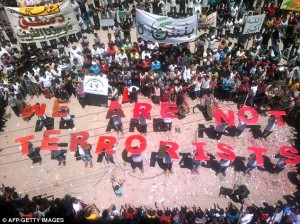 Reports over the weekend on the massacre (door to door, execution style) of over 100 men, women, and children in the Houla region of Syria by forces still loyal to President Bashar al-Assad had the international community recoiling in horror.
Reports over the weekend on the massacre (door to door, execution style) of over 100 men, women, and children in the Houla region of Syria by forces still loyal to President Bashar al-Assad had the international community recoiling in horror.
I have come to Syria at a critical moment in this crisis… I am personally shocked and horrified by the tragic incident in Houla.
(Kofi Annan, UN-Arab League envoy, BBC, May 28, 2012)
Except that all expressions of outrage – by everyone from Annan to U.S. Secretary of State Hillary Clinton – ring hollow when one recalls that reports a few weeks ago on a similar massacre in Homs also had the international community recoiling in horror. Not to mention that this outrage over Homs was itself preceded by similar reaction to reports a few months ago on a similar massacre in Hama.
 Meanwhile, a surprising number of world leaders seemed to take consolation in the ceasefire agreement Annan brokered in the aftermath of Homs. According to it, President Bashar al-Assad promised to stop using tanks and other heavy weaponry to shell the rebel forces who have been trying for 15 months now to bring their version of the Arab Spring to fruition.
Meanwhile, a surprising number of world leaders seemed to take consolation in the ceasefire agreement Annan brokered in the aftermath of Homs. According to it, President Bashar al-Assad promised to stop using tanks and other heavy weaponry to shell the rebel forces who have been trying for 15 months now to bring their version of the Arab Spring to fruition.
 Alas, the only ceasefire agreement more ill-fated than this was the one British PM Neville Chamberlain (and others) brokered in the aftermath of the 1938 annexation of the Sudetenland by Germany. For, according to it, Adolf Hitler promised “never to go to war again.”
Alas, the only ceasefire agreement more ill-fated than this was the one British PM Neville Chamberlain (and others) brokered in the aftermath of the 1938 annexation of the Sudetenland by Germany. For, according to it, Adolf Hitler promised “never to go to war again.”
But all one needs to recoil in utter cynicism at the way the international community has stood by and allowed Assad to massacre thousands of his own people is to know that no less a person than U.S. President Barack Obama pledged the following after Muammar Gaddafi merely threatened to massacre his own people:
Action is necessary … he’s demonstrated his willingness to use brute force… Here’s why this matters to us: Left unchecked, we have every reason to believe Gadhafi would commit atrocities against his own people. Many thousands could die.
(NPR, March 18, 2011)
More to the point, U.S.-led NATO forces backed up Obama’s words by bombing Gaddafi’s forces to such smithereens that rebel forces soon caught the dictator cowering like a rat in a drainage pipe and executed him on the spot.
Of course, many political analysts are asserting that only one word explains NATO getting involved in Libya but not in Syria: oil. And they can cite the way the British government released the Lockerbie bomber to Libya in exchange for oil leases as testament to this fact. But I think there is more to it than that:
NATO got involved primarily because bombing Gaddafi’s forces was like shooting sitting ducks; Obama and other NATO leaders had no reason to fear this bombing igniting a regional conflagration; and Gaddafi had no superpower patron.
By contrast, because the fighting in Syria is confined to such a small, densely populated area, bombing Assad’s forces would likely kill unacceptable numbers of rebel forces and innocent civilians too; given that Syria borders Israel, Lebanon, Turkey, Jordan and Iraq, it would be an understatement to say that NATO bombing might ignite a regional conflagration; and, perhaps above all else, Russia (as patron) is flexing all that remains of its superpower muscle to prevent any foreign intervention.
 This latter point is particularly noteworthy because all one has to know is that the venality and hypocrisy involved in NATO’s bombing of Libya is easily surpassed by the amorality and self-consciousness involved in Russia’s opposition to similar bombing in Syria.
This latter point is particularly noteworthy because all one has to know is that the venality and hypocrisy involved in NATO’s bombing of Libya is easily surpassed by the amorality and self-consciousness involved in Russia’s opposition to similar bombing in Syria.
To be fair though, Russia insists that it is standing on the principle that no nation has the right to interfere in the domestic affairs of another. Except that this principle is patently self-serving and unsustainable. Not least because, pursuant to it, Russia would have to oppose an international coalition to intervene even if Assad were exterminating millions of Jews the way Hitler did during World War II.
 And, by the way, Russia’s attempt to bootstrap Assad’s massacre of his people to the global war against terrorism only makes its support for him all the more unconscionable.
And, by the way, Russia’s attempt to bootstrap Assad’s massacre of his people to the global war against terrorism only makes its support for him all the more unconscionable.
This is why instead of just jumping on the United States and NATO for failing to do in Syria what they did in Libya, I feel compelled to reserve a little condemnation for Russia (and for China – given that it invokes this same specious principle of non-interference in its role as patron to indicted war criminals like President Omar al-Bashir of Sudan).
Mind you, it should be noted that, in addition to protecting geostrategic interests, Russian and Chinese leaders are also expressing solidarity with Assad because he happens to be emulating the brute force they have used, and intend to continue using, to hold on to power in their respective countries.
All the same, it amounts to untenable passivity for the United States and its allies to refuse to at least supply rebel forces with armaments the way Russia and its allies (most notably Iran) are supplying Assad. After all, while diplomats like Annan are expressing fears about Syria descending into full-scale civil war, Assad is waging a de facto civil war against an enemy that does not have the weapons necessary to defend itself.
And, apropos of international outrage ringing hollow, the United States and NATO should bear in mind that Assad would not have been able to perpetrate the massacres in Homs and Houla if they had merely supplied the rebels with weapons as some of us have been pleading for them to do for nearly one year now:
May God in heaven help the pro-democracy protesters in Syria. Because it’s heart-wrenchingly clear that nobody on earth will.
(“Libya, but not Syria,” The iPINIONS Journal, August 2, 2011)
So, at least in this sense, some of the blood of the estimated 10,000 Syrians who, according to the United Nations, have been slaughtered since then is on their hands.
Then there’s this:
Won’t these brutal dictators ever learn…?
Think what you will of the cowardly path Tunisia’s Ben Ali took by fleeing into exile, at least he was smart enough to avoid the humiliation Egypt’s Mubarak is now suffering by being wheeled into court on his death bed to face trial, which will surely end in his Saddam-like execution; or the summary fate that has now befallen Libya’s Gaddafi.
(“Gaddafi is Dead,” The iPINIONS Journal, October 21, 2011)
Frankly, it is stupefying that, despite these instructive precedents, Assad chose to stay and fight rather than take the money and run … when he still could.
Because everybody knows that it’s only a matter of time before growing international outrage compels the United States and NATO to begin providing all manner of military assistance to rebel forces, which may well include ground troops from Turkey. And everybody knows that when his inevitable fall becomes imminent Russia will not hesitate to drop him like a hot potato … just as the United States did with Mubarak.
In any event, the only question now is whether Assad’s dictatorship will end with a whimper like Mubarak’s, or with a bang like Gaddafi’s.
Related commentaries:
Libya, but not Syria
Gaddafi is dead